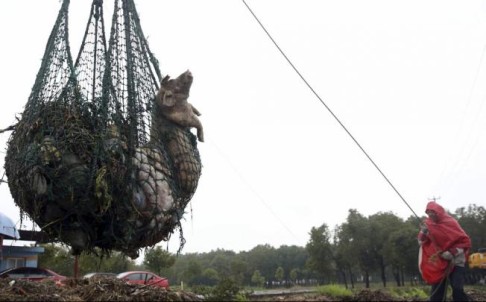Dead pigs pulled from rivers in and near Shanghai top 13,000
Shanghai
authorities say tap water quality remains normal while they step up
search for more carcasses at upper reaches of Huangpu River
Monday, 18 March, 2013 [Updated: 05:28]
A worker hauls away dead pigs with a net in Zhonglian village of Jinshan district in Shanghai. Photo: AP
The number of pig carcasses recovered from rivers in and near Shanghai since early last week has surpassed 13,000.
About 9,500 have been retrieved from the Huangpu River, a source of more than a fifth of the city's drinking water, as workers pulled nearly 500 more pig carcasses from the waterway yesterday. Upstream, the government of Jiaxing said it had recovered around 3,600 from streams in its jurisdiction.
About 80 per cent of the pigs recovered yesterday were young hogs, the Shanghai government said in a statement.
Government spokesman Xu Wei said the authorities were intensifying searches along the upper reaches of the Huangpu and were ready to move to waters bordering Jiaxing to prevent more pig carcasses from floating beyond the area.
Starting from yesterday, all carcasses pulled from the river were taken to the city's animal-incineration centre, the statement said. The government previously said that some of the carcasses were buried near where they were recovered and others were incinerated.
The quality of the river water and tap water in Shanghai remained normal, the government reiterated yesterday.
In addition, six straight days of food-quality checks in the city's markets did not uncover any unqualified pork, it said.
Shanghai also denied online rumours that some local pig farms and pork-derivative producers were connected to the scandal, as Jiaxing had insisted that it was not the only source of all the carcasses being retrieved from the Huangpu.
Shanghai municipal animal heath authorities, who had visited two pig farms and the Shanghai Maling Aquarius Company, a leading canned food producer, said on Saturday after their visits that they did not find any dead pigs or pork derivatives had been illegally disposed of, Xinhua reported.
Meanwhile, the ongoing search for more dead pigs and the clean-up effort continued yesterday in river-interlaced Jiaxing.
Townships had sent out brochures to pig farmers urging them to allow government workers to collect dead pigs instead of disposing them on their own, the website of the Jiaxing Daily reported yesterday.
A series of similar carcass discoveries have been reported across the nation since residents started complaining on March 5 about finding dead pigs in the Huangpu.There has been an abnormally high number of dead hogs following an outbreak of porcine circovirus, a common disease, plus changeable weather this winter, the Ministry of Agriculture said on its website.
About 9,500 have been retrieved from the Huangpu River, a source of more than a fifth of the city's drinking water, as workers pulled nearly 500 more pig carcasses from the waterway yesterday. Upstream, the government of Jiaxing said it had recovered around 3,600 from streams in its jurisdiction.
About 80 per cent of the pigs recovered yesterday were young hogs, the Shanghai government said in a statement.
Government spokesman Xu Wei said the authorities were intensifying searches along the upper reaches of the Huangpu and were ready to move to waters bordering Jiaxing to prevent more pig carcasses from floating beyond the area.
Starting from yesterday, all carcasses pulled from the river were taken to the city's animal-incineration centre, the statement said. The government previously said that some of the carcasses were buried near where they were recovered and others were incinerated.
The quality of the river water and tap water in Shanghai remained normal, the government reiterated yesterday.
In addition, six straight days of food-quality checks in the city's markets did not uncover any unqualified pork, it said.
Shanghai also denied online rumours that some local pig farms and pork-derivative producers were connected to the scandal, as Jiaxing had insisted that it was not the only source of all the carcasses being retrieved from the Huangpu.
Shanghai municipal animal heath authorities, who had visited two pig farms and the Shanghai Maling Aquarius Company, a leading canned food producer, said on Saturday after their visits that they did not find any dead pigs or pork derivatives had been illegally disposed of, Xinhua reported.
Meanwhile, the ongoing search for more dead pigs and the clean-up effort continued yesterday in river-interlaced Jiaxing.
Townships had sent out brochures to pig farmers urging them to allow government workers to collect dead pigs instead of disposing them on their own, the website of the Jiaxing Daily reported yesterday.
A series of similar carcass discoveries have been reported across the nation since residents started complaining on March 5 about finding dead pigs in the Huangpu.There has been an abnormally high number of dead hogs following an outbreak of porcine circovirus, a common disease, plus changeable weather this winter, the Ministry of Agriculture said on its website.
This article first appeared in the
South China Morning Post print edition on Mar 18, 2013 as 9,500 dead
pigs in river source of drinking water

No comments:
Post a Comment